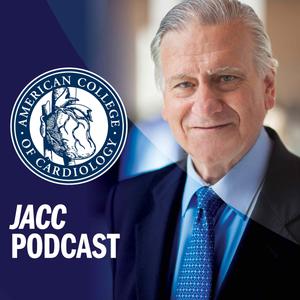
JACC Podcast
American College of Cardiology
- 1 hour 13 minutesAmara Yad Image: The Tricuspid ValveIntroduction (00:00 - 03:00) Dr. Valentin Fuster introduces the focus of the January 28, 2025, issue of JACC on transcatheter tricuspid valve interventions. He emphasizes the growing importance of addressing symptomatic tricuspid regurgitation, a major predictor of morbidity and mortality, and explores potential treatments that aim to improve quality of life and decrease hospitalizations. Transcatheter Tricuspid Valve Repair (03:00 - 20:30) Fuster discusses two key studies: the TRILUMINATE randomized trial and a large European registry. While the TRILUMINATE trial demonstrated significant quality of life improvements using the TriClip device, it did not show a reduction in mortality or heart failure hospitalizations, suggesting the need for longer follow-up in future studies. Meanwhile, the European registry highlights the effectiveness of the Pascal device, showing significant symptomatic improvements and tricuspid regurgitation reduction in high-risk patients. Transcatheter Tricuspid Valve Replacement (20:30 - 35:00) Fuster moves on to discuss the TRISCEND II pivotal trial on transcatheter tricuspid valve replacement. Like the previous repair methods, it primarily improves health status without significantly reducing mortality or hospitalizations, as shown in the trial's findings. He also mentions an excellent state-of-the-art review on this intervention featured in JACC. Imaging in Transcatheter Valve Interventions (35:00 - 45:00) This section highlights the importance of imaging in transcatheter valve interventions. Fuster presents a new project under the leadership of Dr. Kalyanam Shivkumar, aimed at enhancing cardiac anatomy and function resources, supporting advancements in cardiovascular treatments. Conclusion (45:00 - 55:00) Dr. Valentin Fuster wraps up the podcast by summarizing the key takeaways: while current transcatheter interventions show promise in improving symptoms and quality of life for patients with severe tricuspid regurgitation, long-term follow-up is crucial to fully understand their impact on survival and heart failure hospitalizations.20 January 2025, 3:00 pm
- 1 hour 13 minutesTranscatheter Interventions in Tricuspid Regurgitation: Shifting the Focus Beyond Quantity of Life to Quality of LifeIntroduction (00:00 - 03:00) Dr. Valentin Fuster introduces the focus of the January 28, 2025, issue of JACC on transcatheter tricuspid valve interventions. He emphasizes the growing importance of addressing symptomatic tricuspid regurgitation, a major predictor of morbidity and mortality, and explores potential treatments that aim to improve quality of life and decrease hospitalizations. Transcatheter Tricuspid Valve Repair (03:00 - 20:30) Fuster discusses two key studies: the TRILUMINATE randomized trial and a large European registry. While the TRILUMINATE trial demonstrated significant quality of life improvements using the TriClip device, it did not show a reduction in mortality or heart failure hospitalizations, suggesting the need for longer follow-up in future studies. Meanwhile, the European registry highlights the effectiveness of the Pascal device, showing significant symptomatic improvements and tricuspid regurgitation reduction in high-risk patients. Transcatheter Tricuspid Valve Replacement (20:30 - 35:00) Fuster moves on to discuss the TRISCEND II pivotal trial on transcatheter tricuspid valve replacement. Like the previous repair methods, it primarily improves health status without significantly reducing mortality or hospitalizations, as shown in the trial's findings. He also mentions an excellent state-of-the-art review on this intervention featured in JACC. Imaging in Transcatheter Valve Interventions (35:00 - 45:00) This section highlights the importance of imaging in transcatheter valve interventions. Fuster presents a new project under the leadership of Dr. Kalyanam Shivkumar, aimed at enhancing cardiac anatomy and function resources, supporting advancements in cardiovascular treatments. Conclusion (45:00 - 55:00) Dr. Valentin Fuster wraps up the podcast by summarizing the key takeaways: while current transcatheter interventions show promise in improving symptoms and quality of life for patients with severe tricuspid regurgitation, long-term follow-up is crucial to fully understand their impact on survival and heart failure hospitalizations.20 January 2025, 3:00 pm
- 1 hour 13 minutesTranscatheter Tricuspid Valve ReplacementIntroduction (00:00 - 03:00) Dr. Valentin Fuster introduces the focus of the January 28, 2025, issue of JACC on transcatheter tricuspid valve interventions. He emphasizes the growing importance of addressing symptomatic tricuspid regurgitation, a major predictor of morbidity and mortality, and explores potential treatments that aim to improve quality of life and decrease hospitalizations. Transcatheter Tricuspid Valve Repair (03:00 - 20:30) Fuster discusses two key studies: the TRILUMINATE randomized trial and a large European registry. While the TRILUMINATE trial demonstrated significant quality of life improvements using the TriClip device, it did not show a reduction in mortality or heart failure hospitalizations, suggesting the need for longer follow-up in future studies. Meanwhile, the European registry highlights the effectiveness of the Pascal device, showing significant symptomatic improvements and tricuspid regurgitation reduction in high-risk patients. Transcatheter Tricuspid Valve Replacement (20:30 - 35:00) Fuster moves on to discuss the TRISCEND II pivotal trial on transcatheter tricuspid valve replacement. Like the previous repair methods, it primarily improves health status without significantly reducing mortality or hospitalizations, as shown in the trial's findings. He also mentions an excellent state-of-the-art review on this intervention featured in JACC. Imaging in Transcatheter Valve Interventions (35:00 - 45:00) This section highlights the importance of imaging in transcatheter valve interventions. Fuster presents a new project under the leadership of Dr. Kalyanam Shivkumar, aimed at enhancing cardiac anatomy and function resources, supporting advancements in cardiovascular treatments. Conclusion (45:00 - 55:00) Dr. Valentin Fuster wraps up the podcast by summarizing the key takeaways: while current transcatheter interventions show promise in improving symptoms and quality of life for patients with severe tricuspid regurgitation, long-term follow-up is crucial to fully understand their impact on survival and heart failure hospitalizations.20 January 2025, 3:00 pm
- 1 hour 13 minutesThe Amara Yad Project: A New Resource for Cardiac AnatomyIntroduction (00:00 - 03:00) Dr. Valentin Fuster introduces the focus of the January 28, 2025, issue of JACC on transcatheter tricuspid valve interventions. He emphasizes the growing importance of addressing symptomatic tricuspid regurgitation, a major predictor of morbidity and mortality, and explores potential treatments that aim to improve quality of life and decrease hospitalizations. Transcatheter Tricuspid Valve Repair (03:00 - 20:30) Fuster discusses two key studies: the TRILUMINATE randomized trial and a large European registry. While the TRILUMINATE trial demonstrated significant quality of life improvements using the TriClip device, it did not show a reduction in mortality or heart failure hospitalizations, suggesting the need for longer follow-up in future studies. Meanwhile, the European registry highlights the effectiveness of the Pascal device, showing significant symptomatic improvements and tricuspid regurgitation reduction in high-risk patients. Transcatheter Tricuspid Valve Replacement (20:30 - 35:00) Fuster moves on to discuss the TRISCEND II pivotal trial on transcatheter tricuspid valve replacement. Like the previous repair methods, it primarily improves health status without significantly reducing mortality or hospitalizations, as shown in the trial's findings. He also mentions an excellent state-of-the-art review on this intervention featured in JACC. Imaging in Transcatheter Valve Interventions (35:00 - 45:00) This section highlights the importance of imaging in transcatheter valve interventions. Fuster presents a new project under the leadership of Dr. Kalyanam Shivkumar, aimed at enhancing cardiac anatomy and function resources, supporting advancements in cardiovascular treatments. Conclusion (45:00 - 55:00) Dr. Valentin Fuster wraps up the podcast by summarizing the key takeaways: while current transcatheter interventions show promise in improving symptoms and quality of life for patients with severe tricuspid regurgitation, long-term follow-up is crucial to fully understand their impact on survival and heart failure hospitalizations.20 January 2025, 3:00 pm
- 1 hour 13 minutesAdvanced Imaging Assessment of the Impact of Tricuspid Regurgitation on Cardiac Remodeling: The TRILUMINATE Pivotal Imaging SubstudyIntroduction (00:00 - 03:00) Dr. Valentin Fuster introduces the focus of the January 28, 2025, issue of JACC on transcatheter tricuspid valve interventions. He emphasizes the growing importance of addressing symptomatic tricuspid regurgitation, a major predictor of morbidity and mortality, and explores potential treatments that aim to improve quality of life and decrease hospitalizations. Transcatheter Tricuspid Valve Repair (03:00 - 20:30) Fuster discusses two key studies: the TRILUMINATE randomized trial and a large European registry. While the TRILUMINATE trial demonstrated significant quality of life improvements using the TriClip device, it did not show a reduction in mortality or heart failure hospitalizations, suggesting the need for longer follow-up in future studies. Meanwhile, the European registry highlights the effectiveness of the Pascal device, showing significant symptomatic improvements and tricuspid regurgitation reduction in high-risk patients. Transcatheter Tricuspid Valve Replacement (20:30 - 35:00) Fuster moves on to discuss the TRISCEND II pivotal trial on transcatheter tricuspid valve replacement. Like the previous repair methods, it primarily improves health status without significantly reducing mortality or hospitalizations, as shown in the trial's findings. He also mentions an excellent state-of-the-art review on this intervention featured in JACC. Imaging in Transcatheter Valve Interventions (35:00 - 45:00) This section highlights the importance of imaging in transcatheter valve interventions. Fuster presents a new project under the leadership of Dr. Kalyanam Shivkumar, aimed at enhancing cardiac anatomy and function resources, supporting advancements in cardiovascular treatments. Conclusion (45:00 - 55:00) Dr. Valentin Fuster wraps up the podcast by summarizing the key takeaways: while current transcatheter interventions show promise in improving symptoms and quality of life for patients with severe tricuspid regurgitation, long-term follow-up is crucial to fully understand their impact on survival and heart failure hospitalizations.20 January 2025, 3:00 pm
- 1 hour 13 minutesTricuspid Transcatheter Edge-to-Edge Repair for Severe Tricuspid Regurgitation: 1-Year Outcomes From the TRILUMINATE Randomized CohortIntroduction (00:00 - 03:00) Dr. Valentin Fuster introduces the focus of the January 28, 2025, issue of JACC on transcatheter tricuspid valve interventions. He emphasizes the growing importance of addressing symptomatic tricuspid regurgitation, a major predictor of morbidity and mortality, and explores potential treatments that aim to improve quality of life and decrease hospitalizations. Transcatheter Tricuspid Valve Repair (03:00 - 20:30) Fuster discusses two key studies: the TRILUMINATE randomized trial and a large European registry. While the TRILUMINATE trial demonstrated significant quality of life improvements using the TriClip device, it did not show a reduction in mortality or heart failure hospitalizations, suggesting the need for longer follow-up in future studies. Meanwhile, the European registry highlights the effectiveness of the Pascal device, showing significant symptomatic improvements and tricuspid regurgitation reduction in high-risk patients. Transcatheter Tricuspid Valve Replacement (20:30 - 35:00) Fuster moves on to discuss the TRISCEND II pivotal trial on transcatheter tricuspid valve replacement. Like the previous repair methods, it primarily improves health status without significantly reducing mortality or hospitalizations, as shown in the trial's findings. He also mentions an excellent state-of-the-art review on this intervention featured in JACC. Imaging in Transcatheter Valve Interventions (35:00 - 45:00) This section highlights the importance of imaging in transcatheter valve interventions. Fuster presents a new project under the leadership of Dr. Kalyanam Shivkumar, aimed at enhancing cardiac anatomy and function resources, supporting advancements in cardiovascular treatments. Conclusion (45:00 - 55:00) Dr. Valentin Fuster wraps up the podcast by summarizing the key takeaways: while current transcatheter interventions show promise in improving symptoms and quality of life for patients with severe tricuspid regurgitation, long-term follow-up is crucial to fully understand their impact on survival and heart failure hospitalizations.20 January 2025, 3:00 pm
- 1 hour 13 minutesTranscatheter Valve Repair for Tricuspid Regurgitation: 1-Year Results From a Large European Real-World RegistryIntroduction (00:00 - 03:00) Dr. Valentin Fuster introduces the focus of the January 28, 2025, issue of JACC on transcatheter tricuspid valve interventions. He emphasizes the growing importance of addressing symptomatic tricuspid regurgitation, a major predictor of morbidity and mortality, and explores potential treatments that aim to improve quality of life and decrease hospitalizations. Transcatheter Tricuspid Valve Repair (03:00 - 20:30) Fuster discusses two key studies: the TRILUMINATE randomized trial and a large European registry. While the TRILUMINATE trial demonstrated significant quality of life improvements using the TriClip device, it did not show a reduction in mortality or heart failure hospitalizations, suggesting the need for longer follow-up in future studies. Meanwhile, the European registry highlights the effectiveness of the Pascal device, showing significant symptomatic improvements and tricuspid regurgitation reduction in high-risk patients. Transcatheter Tricuspid Valve Replacement (20:30 - 35:00) Fuster moves on to discuss the TRISCEND II pivotal trial on transcatheter tricuspid valve replacement. Like the previous repair methods, it primarily improves health status without significantly reducing mortality or hospitalizations, as shown in the trial's findings. He also mentions an excellent state-of-the-art review on this intervention featured in JACC. Imaging in Transcatheter Valve Interventions (35:00 - 45:00) This section highlights the importance of imaging in transcatheter valve interventions. Fuster presents a new project under the leadership of Dr. Kalyanam Shivkumar, aimed at enhancing cardiac anatomy and function resources, supporting advancements in cardiovascular treatments. Conclusion (45:00 - 55:00) Dr. Valentin Fuster wraps up the podcast by summarizing the key takeaways: while current transcatheter interventions show promise in improving symptoms and quality of life for patients with severe tricuspid regurgitation, long-term follow-up is crucial to fully understand their impact on survival and heart failure hospitalizations.20 January 2025, 3:00 pm
- 1 hour 13 minutesAdvances in Transcatheter Tricuspid Valve Interventions: Implications for Health PolicyIntroduction (00:00 - 03:00) Dr. Valentin Fuster introduces the focus of the January 28, 2025, issue of JACC on transcatheter tricuspid valve interventions. He emphasizes the growing importance of addressing symptomatic tricuspid regurgitation, a major predictor of morbidity and mortality, and explores potential treatments that aim to improve quality of life and decrease hospitalizations. Transcatheter Tricuspid Valve Repair (03:00 - 20:30) Fuster discusses two key studies: the TRILUMINATE randomized trial and a large European registry. While the TRILUMINATE trial demonstrated significant quality of life improvements using the TriClip device, it did not show a reduction in mortality or heart failure hospitalizations, suggesting the need for longer follow-up in future studies. Meanwhile, the European registry highlights the effectiveness of the Pascal device, showing significant symptomatic improvements and tricuspid regurgitation reduction in high-risk patients. Transcatheter Tricuspid Valve Replacement (20:30 - 35:00) Fuster moves on to discuss the TRISCEND II pivotal trial on transcatheter tricuspid valve replacement. Like the previous repair methods, it primarily improves health status without significantly reducing mortality or hospitalizations, as shown in the trial's findings. He also mentions an excellent state-of-the-art review on this intervention featured in JACC. Imaging in Transcatheter Valve Interventions (35:00 - 45:00) This section highlights the importance of imaging in transcatheter valve interventions. Fuster presents a new project under the leadership of Dr. Kalyanam Shivkumar, aimed at enhancing cardiac anatomy and function resources, supporting advancements in cardiovascular treatments. Conclusion (45:00 - 55:00) Dr. Valentin Fuster wraps up the podcast by summarizing the key takeaways: while current transcatheter interventions show promise in improving symptoms and quality of life for patients with severe tricuspid regurgitation, long-term follow-up is crucial to fully understand their impact on survival and heart failure hospitalizations.20 January 2025, 3:00 pm
- 1 hour 13 minutesQuality of Life After Transcatheter Tricuspid Valve Replacement: 1-Year Results From TRISCEND II Pivotal TrialIntroduction (00:00 - 03:00) Dr. Valentin Fuster introduces the focus of the January 28, 2025, issue of JACC on transcatheter tricuspid valve interventions. He emphasizes the growing importance of addressing symptomatic tricuspid regurgitation, a major predictor of morbidity and mortality, and explores potential treatments that aim to improve quality of life and decrease hospitalizations. Transcatheter Tricuspid Valve Repair (03:00 - 20:30) Fuster discusses two key studies: the TRILUMINATE randomized trial and a large European registry. While the TRILUMINATE trial demonstrated significant quality of life improvements using the TriClip device, it did not show a reduction in mortality or heart failure hospitalizations, suggesting the need for longer follow-up in future studies. Meanwhile, the European registry highlights the effectiveness of the Pascal device, showing significant symptomatic improvements and tricuspid regurgitation reduction in high-risk patients. Transcatheter Tricuspid Valve Replacement (20:30 - 35:00) Fuster moves on to discuss the TRISCEND II pivotal trial on transcatheter tricuspid valve replacement. Like the previous repair methods, it primarily improves health status without significantly reducing mortality or hospitalizations, as shown in the trial's findings. He also mentions an excellent state-of-the-art review on this intervention featured in JACC. Imaging in Transcatheter Valve Interventions (35:00 - 45:00) This section highlights the importance of imaging in transcatheter valve interventions. Fuster presents a new project under the leadership of Dr. Kalyanam Shivkumar, aimed at enhancing cardiac anatomy and function resources, supporting advancements in cardiovascular treatments. Conclusion (45:00 - 55:00) Dr. Valentin Fuster wraps up the podcast by summarizing the key takeaways: while current transcatheter interventions show promise in improving symptoms and quality of life for patients with severe tricuspid regurgitation, long-term follow-up is crucial to fully understand their impact on survival and heart failure hospitalizations.20 January 2025, 3:00 pm
- 1 hour 13 minutesTricuspid Valve Interventions: A New Era in Cardiovascular InnovationIntroduction (00:00 - 03:00) Dr. Valentin Fuster introduces the focus of the January 28, 2025, issue of JACC on transcatheter tricuspid valve interventions. He emphasizes the growing importance of addressing symptomatic tricuspid regurgitation, a major predictor of morbidity and mortality, and explores potential treatments that aim to improve quality of life and decrease hospitalizations. Transcatheter Tricuspid Valve Repair (03:00 - 20:30) Fuster discusses two key studies: the TRILUMINATE randomized trial and a large European registry. While the TRILUMINATE trial demonstrated significant quality of life improvements using the TriClip device, it did not show a reduction in mortality or heart failure hospitalizations, suggesting the need for longer follow-up in future studies. Meanwhile, the European registry highlights the effectiveness of the Pascal device, showing significant symptomatic improvements and tricuspid regurgitation reduction in high-risk patients. Transcatheter Tricuspid Valve Replacement (20:30 - 35:00) Fuster moves on to discuss the TRISCEND II pivotal trial on transcatheter tricuspid valve replacement. Like the previous repair methods, it primarily improves health status without significantly reducing mortality or hospitalizations, as shown in the trial's findings. He also mentions an excellent state-of-the-art review on this intervention featured in JACC. Imaging in Transcatheter Valve Interventions (35:00 - 45:00) This section highlights the importance of imaging in transcatheter valve interventions. Fuster presents a new project under the leadership of Dr. Kalyanam Shivkumar, aimed at enhancing cardiac anatomy and function resources, supporting advancements in cardiovascular treatments. Conclusion (45:00 - 55:00) Dr. Valentin Fuster wraps up the podcast by summarizing the key takeaways: while current transcatheter interventions show promise in improving symptoms and quality of life for patients with severe tricuspid regurgitation, long-term follow-up is crucial to fully understand their impact on survival and heart failure hospitalizations.20 January 2025, 3:00 pm
- 44 minutes 6 secondsInitial Decline In Glomerular Filtration Rate With Finerenone In Hfmref/Hfpef: a Prespecified Analysis of Finearts-Hf
Podcast Overview
The podcast, hosted by Valentin Fuster on January 21, 2025, provides an in-depth review of the FINEARTS-HF trial, which evaluated the efficacy of the non-steroidal mineralocorticoid receptor antagonist finerenone in patients with heart failure and mildly reduced or preserved ejection fraction (HFmrEF/HFpEF). The episode highlights findings published in the Journal of the American College of Cardiology (JACC).
Introduction to the FINEARTS-HF Trial (00:03:19 – 00:05:56) The FINEARTS-HF trial demonstrated that finerenone reduced heart failure events by 16% compared to placebo in patients with HFmrEF/HFpEF. However, cardiovascular death rates were similar between groups, making the overall clinical impact moderate.
Finerenone’s Impact on Quality of Life (00:05:59 – 00:12:46) The trial assessed quality of life using the Kansas City Cardiomyopathy Questionnaire (KCCQ), revealing only a slight improvement (1.62 points) with finerenone. Critics, including the FDA, questioned the clinical relevance of these results and suggested the need for simpler, more meaningful patient-reported outcome measures.
Finerenone in Patients with Recent Worsening Heart Failure (00:12:58 – 00:20:30) Patients with recent worsening heart failure showed a greater absolute benefit from finerenone, as they were at higher risk of recurrent events and cardiovascular death. However, further studies are needed to confirm these findings.
Finerenone’s Role in Obese Patients with HFmrEF/HFpEF (00:20:31 – 00:25:20) In obese patients, the benefits of finerenone were consistent across body mass index (BMI) categories, with a possible greater effect in those with higher BMI. Nevertheless, the reliance on BMI as a metric for obesity was criticized, and alternative measures were recommended.
Finerenone and Kidney Outcomes (00:25:23 – 00:40:52) Finerenone showed a modest reduction in albuminuria but did not significantly alter kidney disease progression. Initial declines in glomerular filtration rate (GFR) were noted but should not automatically lead to discontinuation of therapy. Mixed findings highlight the need for more research to understand its renal effects.
Conclusion (00:40:54 – 00:44:05) The FINEARTS-HF trial was recognized as a landmark study, showcasing modest benefits of finerenone in a challenging patient population. The podcast calls for continued research to refine quality of life metrics, better understand obesity’s role in HFmrEF/HFpEF, and explore finerenone’s long-term renal and cardiovascular impacts.
13 January 2025, 3:00 pm - More Episodes? Get the App
Your feedback is valuable to us. Should you encounter any bugs, glitches, lack of functionality or other problems, please email us on [email protected] or join Moon.FM Telegram Group where you can talk directly to the dev team who are happy to answer any queries.
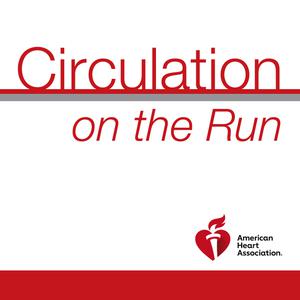 Circulation on the Run
Circulation on the Run
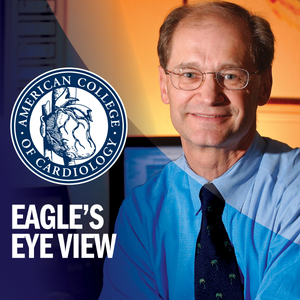 Eagle's Eye View: Your Weekly CV Update From ACC.org
Eagle's Eye View: Your Weekly CV Update From ACC.org
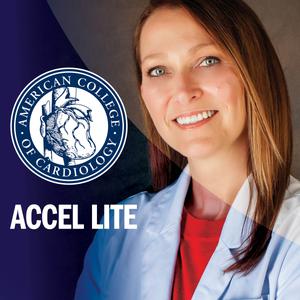 ACCEL Lite: Featured ACCEL Interviews on Exciting CV Research
ACCEL Lite: Featured ACCEL Interviews on Exciting CV Research
 Cardionerds: A Cardiology Podcast
Cardionerds: A Cardiology Podcast
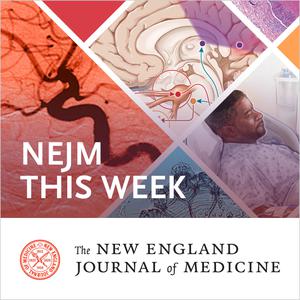 NEJM This Week
NEJM This Week
 This Week in Cardiology
This Week in Cardiology